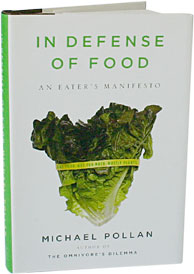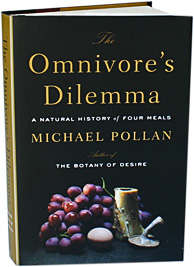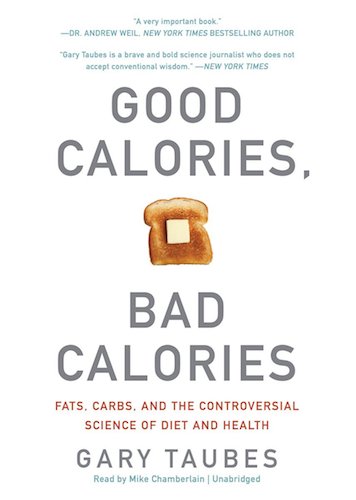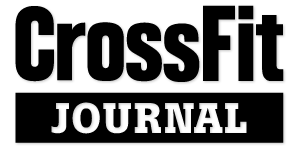Although I talk a lot about exercise, there is another component to being healthy that is worth discussing: diet. Don’t worry, I’m not going to tell you what to eat or what to avoid. It’s not that I don’t have opinions on this topic - if you know me, you’re probably used to me butting in with my opinion on all topics - but rather that this kind of thing works best if you do the research and make up your own mind. To that end, I’m going to use this blog post to list some of the better resources I’ve found regarding food. If you’re aware of other good ones, feel free to share them in the comments.
In Defense of Food

Eat food. Not too much. Mostly plants. Those three phrases pretty much sum up the entire book. But you still might want to read it, as there is a bit of a back-story to it. Pollan’s main argument is that (a) the absurd spike in obesity in the last several decades most likely comes form a change in our food supply, (b) food/nutrition science is a remarkably difficult field that has not produced any satisfying answers on exactly which changes are causing the problems and (c) until they get it figured out, we can rely on some common sense and reason to come up with a diet that is likely to be healthy. Pollan’s discussion of the state of dietary research is eye opening: you will remember it the next time a “scientists discover that X causes obesity!” study pops up on the news.
The Omnivore’s Dilemma

Another Michael Pollan book that is a great resource for understanding the food supply. In this one, he goes through four meals: one that comes from industrial farming (fast food), one from an industrial organic farm, one from an “alternative/sustainable” organic farm, and one that he grows, forages and hunts himself. This book gives you a small glimpse into where your food really comes from, something most people don’t take into consideration nearly enough.
Good Calories, Bad Calories

There are two key reasons to read this book: first, it thoroughly debunks the idea that dietary fat is bad for you. Or, to be more accurate, it simply shows how little evidence there was for the “eating fat makes you fat” hypothesis in the first place. Second, the book does a good job of discussing how not all calories are created equal. That is, calorie counting alone is not sufficient for maintaining a healthy diet. To be clear, Taubes isn’t saying that the laws of thermodynamics don’t apply, but rather that the way the body processes calories from different types of foods has a wide variety of hard to predict side effects. While the “carbohydrate hypothesis” Taubes proposes in this book is controversial—Taubes himself says a great deal of research is required to prove it—the book is important for recognizing that the type of food you eat is just as important as the quantity.
The rest
I’ve read a few other books on diet and nutrition, such as Enter the Zone, but in all honesty, I wouldn’t recommend them. The majority of those books just feel like marketing gimmicks trying to sell the book and related products. Therefore, the rest of the resources I post are blogs, articles, online discussions, and studies I’ve come across that contain useful nuggets of information. As with everything else, take them with a grain of salt: their value is in providing the context for how to think about diet issues.
Blogs

Lyle McDonald’s blog that features tons of well regarded articles on diet and nutrition. I don’t agree with everything he writes, but he has some real gems on there, such as The Energy Balance Equation, The Fundamentals of Fat Loss Diets, Carbohydrate and Fat Controversies, and Protein Controversies.

A blog that focuses primarily on the paleo diet. I find paleo a little too hardcore, illogical and unrealistic for my tastes, but it works for many and Robb’s blog has some good articles.

Although the website is starting to look more and more like marketing material, it’s actually one of the absolute best (and free) resources on the web for both strength training and diet. The How to Build Muscle and GOMAD articles are good starting points if you’re trying to get bigger.

The Crossfit Journal contains articles and videos about all things Crossfit: exercise instruction, competition videos, equipment guides, and, as is relevant to this blog post, nutrition articles. It’s $25/year for a subscription, well worth it if you do Crossfit.
Random articles, studies and discussions
A bunch of useful links I’ve collected over the years. There are many others I’ve lost, so I may update this list over time as I find them.
- Top Ten Fasting Myths Debunked: do you think that eating many small meals increases your metabolism? Do you believe that the body can only absorb 30g of protein per meal? Are you the one telling everyone to not eat after 8pm? Yea, should probably read this article.
- The Calorie Delusion: Why Food Labels are Wrong: calorie counting is an imperfect science to begin with. Inaccurate food labels make this all the worse.
- The Myth About Muscle and Metabolism: how many calories per day do you think a pound of muscle burns? Nope. You’re not even close. Read the article.
- Crossfit Nutrition Forum: Crossfit’s messageboard is a good place to post questions on fitness and nutrition. Check out this epic thread I started long ago: Why bother with the Zone (or any other “name” diet)?
- “A calorie is a calorie” violates the second law of thermodynamics
- The Science of Fat-Loss: Why a Calorie Isn’t Always a Calorie
Bryan Covell
If you enjoyed this post, you may also like my books, Hello, Startup and Terraform: Up & Running. If you need help with DevOps or infrastructure, reach out to me at Gruntwork.
